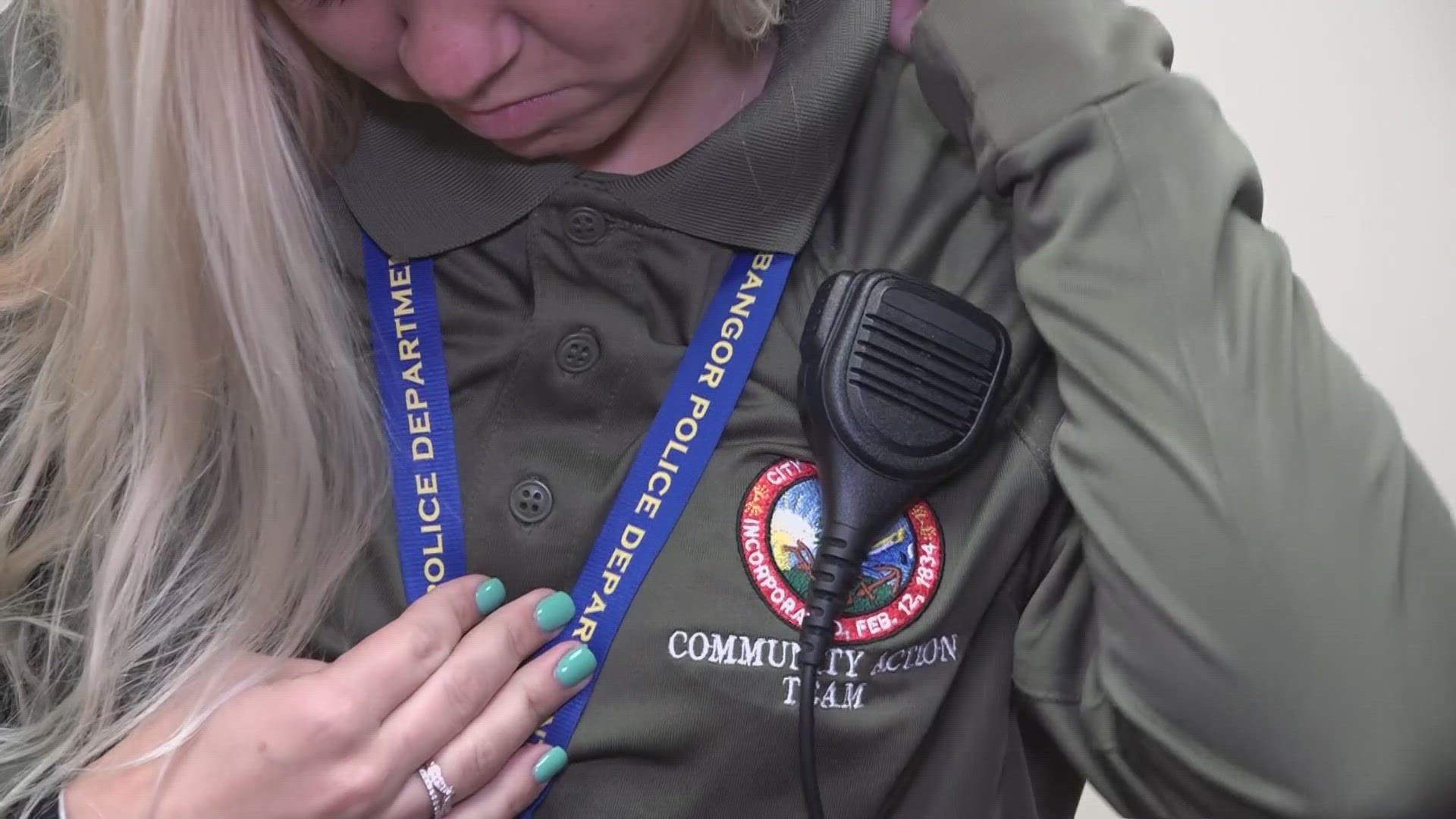BANGOR, Maine — Like many police departments across the state, staffing shortages continue to be a challenge for police in Bangor. The department's new Bangor Community Action Team (BCAT) is helping ease the workload for officers by responding to non-emergency calls.
Bangor Police Department Public Information Officer Sgt. Jason McAmbley said the BCAT team has been operating since January of last year, and has responded to 1,161 calls for service.
BCAT started with only one specialist, Justin Garcelon. But now with a team of three, the specialized team is functioning in full swing.
Specialists on the team complete well-being visits, connect unhoused people with outreach resources, and have even saved lives using Narcan to reverse overdoses.
Before the team was implemented into the department, police officers were required to respond to non-emergency calls despite understaffing. McAmbley said people call 911 for everything, and as a result, police officers are expected to respond to calls that he said are often more appropriate to be handled by a social worker or by a mental health specialist.
"How much should a police agency be responsible for?" McAmbley said. "We did not sign up to be mental health case workers or social workers or anything like that. This job has changed so much from keeping the peace to we're supposed to be all things to all people. We can't do it."
McAmbley said the department does not have enough resources to consistently wrestle with the mental health crisis and widespread homelessness that plagues the city and surrounding areas.
He said he believes it's critical to give his employees room to exercise their respective skill sets, allowing police officers to focus on maintaining peace and safety in the community and assigning designated people who have backgrounds in social work to address non-emergency calls.
BCAT specialists receive 40 hours of crisis intervention training, McAmbley said it allows them to take a more personal, relatable, and softer approach to interacting with people in the community.
"They don't teach you that in the police academy. You learn how to shoot a gun; you learn how to drive a car. You learn how to arrest and wrestle people," McAmbley said vaguely and jokingly.
Police officers are tasked with showing up to every scene with few available details, McAmbley said. Officers are often expected to make split-second decisions, and because of gaps in the training that police officers receive, McAmbley said officers simply can't get it right all the time.
Sometimes the wrong split-second decision can result in a tragedy, he said. McAmbley emphasized that officers are not trained to provide social work services and sending police officers to specialized training that is not related to their specific job roles is expensive and creates strains on available financial resources within the department.
Short staffing across the profession also makes attending specialized trainings to sharpen various skills that are not directly related to policing a difficult goal to meet.
He said when hiring, the HR department prefers candidates who have some experience in social work services experience.
Although there are currently three specialists who work on the BCAT team, Garcelon was the only specialist on the team for nearly a full year. After seeing how much is involved in helping people in the community and responding to various non-emergency scenarios, Garcelon said he believes the taskforce is needed, explaining that having multiple people complete various tasks helps the department as a whole.
"There's just not enough time in the day for everyone to handle everything," Garcelon said.
Garcelon said BCAT specialists like him are extremely knowledgeable about outreach resources and organizations that support the unhoused community. He said the average police officer may not be well-informed about how to connect people experiencing homelessness with case workers or to other organizations that are available to help.
"A lot of times, we're kind of the only people who will approach these people who are in need and say, 'Hey how can we help you? What do you need?'" Nicolette Thurlow said.
Thurlow previously worked full-time at Acadia hospital. She and her co-worker Mackenzie Barnhart agreed that no two days are alike, and people really appreciate the help that they receive from the BCAT team.
"I've learned to approach every situation with a fresh mind with compassion," Barnhart said.
With the team's success, McAmbley said he looks forward to watching the taskforce grow. He said several police departments have reached out to him to see how the team is impacting the department, keeping their eyes on Bangor to see if incorporating a team like BCAT in their departments would be beneficial.
"This will be copied all over the place once we get the model the way we want it," McAmbley said "We're going to see agencies say, 'We want you to do it like Bangor does it.'"
McAmbley said police departments need to reassess how policing is done and work to make improvements where they can. He said he still needs about 11 police officers to fully staff his department, and he plans to add at least five more people to the BCAT team.

